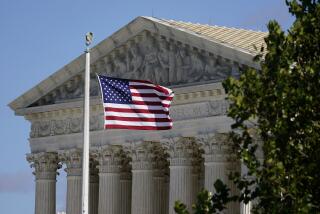U.S. Supreme Court Rules Age Bias Damages Are Taxable : Law: Justices overturn prevailing judgments in 6-3 vote. Decision could prove costly to thousands who lose jobs through corporate downsizing.
WASHINGTON — Victims of age discrimination who win damages from their employers must pay federal taxes on the amount, the Supreme Court ruled Wednesday.
The 6-3 decision reverses the prevailing rule in several federal appeals courts. It could also prove a costly setback for thousands of workers who lose their jobs through a corporate downsizing and accept a settlement of age-discrimination charges.
In general, damages won through a lawsuit are exempt from taxes, whether the money comes from a routine auto accident or a race bias claim. The federal tax code does not count as income money “received whether by suit or agreement . . . on account of personal injuries or sickness.”
However, the high court said that money won through an age-discrimination case either makes up for lost income or punishes the company, but is not compensation for a “personal injury.” Because the Age Discrimination in Employment Act “provides no compensation for any of the other traditional harms associated with personal injury,” the money award is subject to taxes, wrote Justice John Paul Stevens for the court.
The ruling in Commissioner of Internal Revenue vs. Schleier, 94-500, will require several retired United Airlines pilots to pay a hefty back-tax bill. In 1986, they challenged United’s policy forcing pilots to retire at age 60 and they won a large money settlement.
In recent years, the federal appeals courts based in San Francisco, Chicago and New Orleans in separate cases ruled that United pilots who won the settlements need not pay taxes on the amount.
Wednesday’s ruling reverses those judgments.
In dissent, Justices Sandra Day O’Connor, David H. Souter and Clarence Thomas said the court should follow a consistent approach and make all damage awards exempt from taxation.
Lawyers say the ruling could be costly, both for workers and employers, because the age-discrimination law increasingly figures in settlements when older employees are dismissed.
The law protects employees over age 40, many of whom are encouraged to file damage claims if they are dismissed in a corporate downsizing.
Rather than contest the suits, many companies offer a settlement. But before Wednesday, neither side had assumed that a large portion of the money will be taxed, so settlements might increase or plaintiffs will not receive as much money.
In a second ruling Wednesday, the court slightly narrowed the double-jeopardy protection, ruling that a criminal’s conduct can figure in one sentence hearing and in a second prosecution.
The 8-1 decision upholds a cocaine trafficking conviction against a Texas man, even though his cocaine business has been cited in a hearing to lengthen his sentence for a marijuana conviction.
The court said the Fifth Amendment forbids a “multiple punishment” for the same crime, but it defined punishment narrowly to mean a conviction only. It is not a double punishment if that conviction is used in another prosecution to enhance the sentence for a second crime, the court said.
In this case, Witte vs. U.S., 94-6187, Steven K. Witte was properly convicted and sentenced to prison for importing cocaine, the court said, even though a judge had earlier used the same evidence of cocaine importing to increase his sentence for a separate marijuana conviction.
More to Read
Get the L.A. Times Politics newsletter
Deeply reported insights into legislation, politics and policy from Sacramento, Washington and beyond. In your inbox three times per week.
You may occasionally receive promotional content from the Los Angeles Times.











